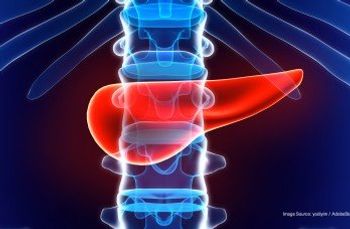
Rigosertib/Gemcitabine Combo Failed to Improve Survival in Pancreatic Cancer
Patients with treatment-naive metastatic pancreatic cancer assigned to treatment with gemcitabine plus rigosertib did not have any improvement in tumor response or survival compared with treatment with gemcitabine alone.
Patients with treatment-naive metastatic pancreatic cancer assigned to a combination treatment with gemcitabine plus the Ras mimetic rigosertib did not have any improvement in tumor response or survival compared with treatment with gemcitabine alone, according to the results of a phase II/III study
Rigosertib is a first-in-class drug that inhibits both the phosphatidylinositide 3-kinase (PI3K) and polo-like kinase 1 (PLK1) pathways and showed promise against metastatic pancreatic cancer in two phase I trials.
“Recent data have shown that rigosertib binds to the RBD of downstream Ras effector proteins, thus preventing their activation. In addition, preclinical data in cell lines and patient-derived xenografts have shown that rigosertib may act synergistically with gemcitabine in resistant pancreatic cancer cell lines,” wrote researchers led by B. H. O’Neil, MD, of Indiana University School of Medicine.
However, this small randomized trial combining rigosertib with gemcitabine resulted in a median overall survival of 6.1 months compared with 6.4 months with gemcitabine alone (hazard ratio [HR], 1.24 [95% CI, 0.85–1.81]).
The trial randomly assigned 160 patients 2:1 to gemcitabine 1,000 mg/m2 weekly for 3 weeks of a 4-week cycle plus rigosertib 1,800 mg/m2 as a 2-hour continuous IV infusion twice weekly for 3 weeks of a 4-week cycle, or to gemcitabine alone.
No significant difference in overall survival was noted between the two treatment arms, and the median progression-free survival was 3.4 months for both arms. Additionally, 19% of patients assigned the combination had a partial response compared with 13% of patients assigned gemcitabine. A greater percentage of patients in the gemcitabine arm experienced stable disease (56% vs 50%).
The safety outcomes with rigosertib were similar to those seen in previous trials. Overall, the most common adverse effects for both arms were fatigue, nausea, and hyponatremia. Both hyponatremia (25% for combo vs 6%) and an increased aspartate aminotransferase level (15% for combo vs 9%) were much higher in the combination group.
“While the specific mechanisms for the lack of improved efficacy with the combination of rigosertib and gemcitabine in this study remain unclear, there are likely multiple contributing factors,” the researchers wrote. “Based on the results of our trial, there are no current plans to perform further trials with the use of rigosertib in pancreatic cancer.”
Newsletter
Stay up to date on recent advances in the multidisciplinary approach to cancer.











































